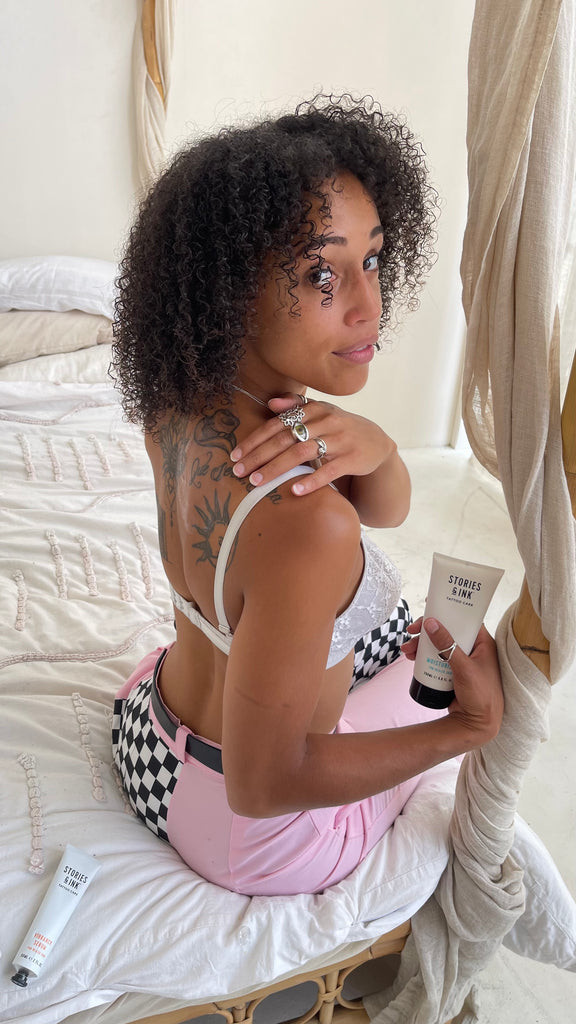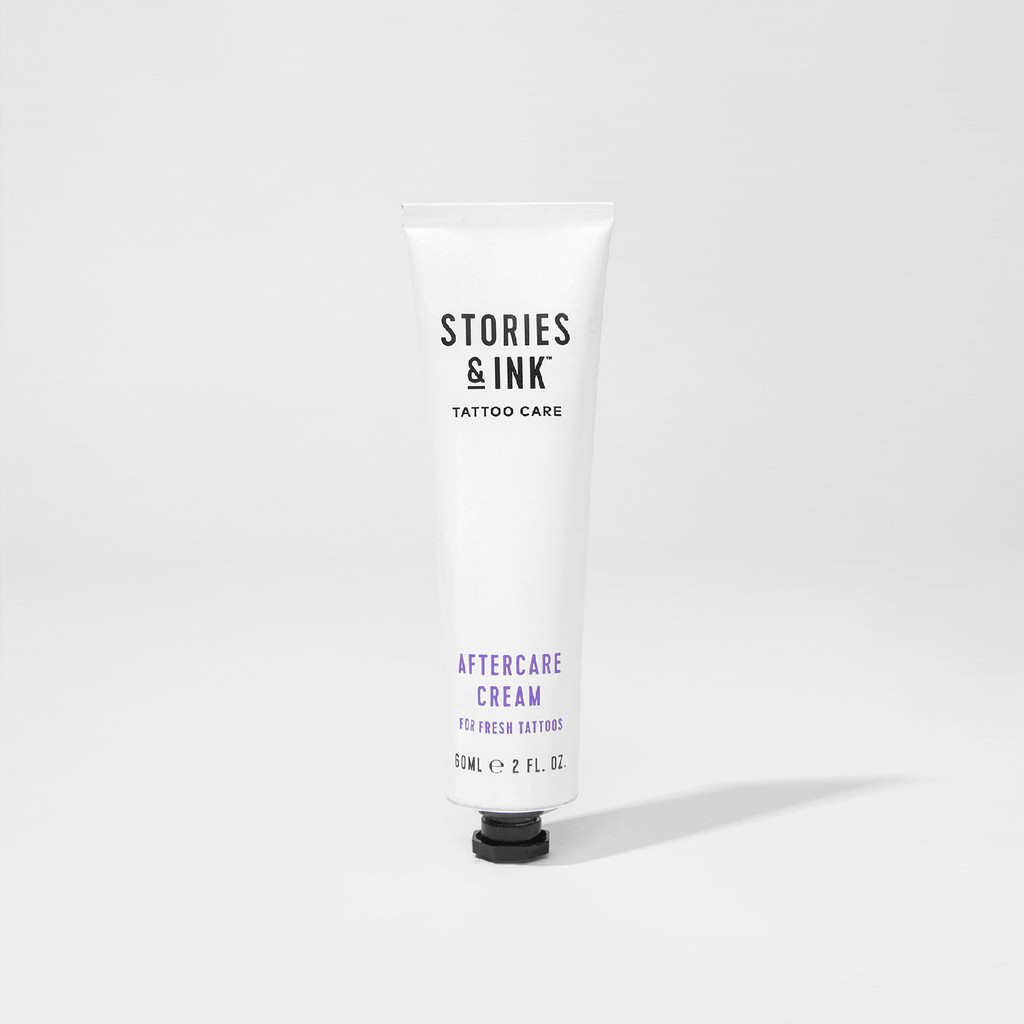Is your tattoo itchy? Don’t panic! Tattoo itching is a common part of the tattoo healing process, but understanding why it happens and how to manage it can make the experience much more comfortable. At tattooat.com, we provide expert guidance to ensure your tattoo journey is smooth and enjoyable, offering insights into aftercare, potential allergic reactions, and the best ways to keep your tattoo looking vibrant. Let’s dive into the world of tattoo aftercare, address the causes of the itch, and explore effective relief strategies so you can confidently nurture your skin art.
1. What Causes Tattoo Itching?
Tattoo itching occurs as the skin heals from the tattooing process, but it can also be due to allergies. As your skin repairs itself, you may experience mild to intense itching. Several factors contribute to this sensation.
- Healing Process: After getting a tattoo, your skin goes through several stages of healing, including inflammation, scabbing, and regeneration. These stages naturally cause itching.
- Histamine Release: The body’s immune system releases histamine in response to the tattoo ink, which can cause the skin to itch.
- Dry Skin: Dryness around the tattooed area can exacerbate itching. Keeping the skin moisturized is crucial during the healing process.
- Allergic Reactions: In some cases, itching can be a sign of an allergic reaction to the tattoo ink or aftercare products.
2. How Long Will My Tattoo Itch For?
The duration of tattoo itching varies, but it typically lasts for a week or two. On average, expect itching to persist for about 1 to 3 weeks as the skin undergoes its initial healing phases. Factors influencing this timeline include:
- Individual Healing Rate: Everyone’s skin heals at a different pace.
- Tattoo Size and Placement: Larger tattoos or those in areas with more friction may take longer to heal and itch for a more extended period.
- Aftercare Practices: Proper aftercare can significantly reduce the duration and intensity of itching.
 Woman carefully applying aftercare lotion to her arm tattoo
Woman carefully applying aftercare lotion to her arm tattoo
3. Tattoo Itching vs. Infection: How to Tell the Difference?
Differentiating between normal tattoo itching and signs of infection is essential for proper care. While itching is common during healing, specific symptoms indicate a potential infection:
| Symptom | Normal Itching | Infection |
|---|---|---|
| Itching | Mild to moderate | Severe, persistent |
| Redness | Slight, localized | Spreading, intense |
| Swelling | Minimal | Significant, increasing |
| Discharge | None | Pus or fluid |
| Pain | Mild discomfort | Increasing pain |
| Skin Temperature | Normal or slightly warm | Hot to the touch |
| Other Symptoms | Possible peeling, flaking | Fever, chills, swollen lymph nodes |
| Healing Progress | Steady improvement | Worsening condition, no improvement |
| Action | Continue regular aftercare, monitor for changes | Consult a healthcare professional immediately |
If you notice signs of infection, seek medical attention promptly to prevent complications and ensure your tattoo heals properly.
4. Why is My Old Tattoo Itching?
An old tattoo itching can be due to several reasons unrelated to the initial healing process. Understanding these causes can help you provide the right care:
- Dry Skin: As skin ages, it naturally becomes drier. This can cause old tattoos to itch, especially in dry climates.
- Allergies: You might develop an allergy to something that comes into contact with your tattoo, such as certain lotions, soaps, or environmental allergens.
- Sun Exposure: Sunburn can cause any area of skin to itch, including tattooed areas. Tattoos can fade and become irritated with prolonged sun exposure.
- Skin Conditions: Conditions like eczema or psoriasis can cause itching on or around old tattoos.
- Changes in Weather: Extreme temperatures or humidity can affect skin hydration and cause itching.
According to research from Portland State University’s Art Department, in July 2025, tattoos can change over time and react differently to environmental factors years after the initial application.
5. Effective Home Remedies to Soothe Tattoo Itching
There are several home remedies you can use to relieve tattoo itching. These methods can provide comfort and support the healing process:
- Cold Compresses: Applying a cold compress can help reduce inflammation and numb the area, providing temporary relief from itching.
- Moisturize Regularly: Keeping the tattooed area moisturized prevents dryness, which can exacerbate itching. Use a fragrance-free, hypoallergenic lotion.
- Gentle Cleansing: Gently wash the tattoo with mild, fragrance-free soap and lukewarm water to remove irritants.
- Loose Clothing: Wear loose, breathable clothing to minimize friction and irritation.
- Oatmeal Baths: Colloidal oatmeal baths can soothe irritated skin and reduce itching.
6. The Do’s and Don’ts of Managing an Itchy Tattoo
Proper care is essential for managing an itchy tattoo and ensuring it heals well. Here are some do’s and don’ts:
Do’s:
- Moisturize: Apply a thin layer of fragrance-free, hypoallergenic lotion regularly.
- Keep it Clean: Gently wash the tattoo with mild soap and lukewarm water.
- Apply Cold Compresses: Use a cold compress to relieve itching and inflammation.
- Wear Loose Clothing: Choose loose, breathable fabrics.
- Pat, Don’t Scratch: If you need to relieve the itch, gently pat the area instead of scratching.
Don’ts:
- Scratch: Avoid scratching the tattoo, as it can cause damage and increase the risk of infection.
- Use Harsh Products: Stay away from scented lotions, perfumes, and products containing alcohol.
- Sun Exposure: Protect your tattoo from direct sunlight.
- Soak the Tattoo: Avoid prolonged soaking in water, such as swimming or taking long baths.
- Pick at Scabs: Let scabs fall off naturally to prevent scarring.
7. Tattoo Aftercare Products: What to Look For?
Choosing the right aftercare products is crucial for tattoo healing and reducing itchiness. Look for products that are:
- Fragrance-Free: Fragrances can irritate the skin.
- Hypoallergenic: Reduces the risk of allergic reactions.
- Non-Comedogenic: Won’t clog pores.
- Alcohol-Free: Alcohol can dry out the skin.
- Specifically Designed for Tattoos: Products formulated for tattoo aftercare often contain ingredients that promote healing and reduce inflammation.
 Stories & Ink Aftercare Cream
Stories & Ink Aftercare Cream
8. When to Seek Professional Help for an Itchy Tattoo
While most tattoo itching can be managed with home remedies and proper aftercare, there are situations when professional help is necessary. Consult a healthcare provider if you experience:
- Signs of Infection: Increased pain, swelling, redness, pus, or fever.
- Severe Allergic Reaction: Difficulty breathing, hives, or severe itching.
- Persistent Itching: Itching that doesn’t improve with home remedies after several weeks.
- Changes in Tattoo Appearance: Fading, distortion, or raised areas.
9. Can Tattoo Ink Cause Itching? Understanding Ink Allergies
Yes, tattoo ink can cause itching, especially if you have an allergic reaction. Tattoo ink allergies can develop immediately after getting a tattoo or years later. Common signs of an ink allergy include:
- Persistent Itching: Itching that lasts longer than the typical healing period.
- Redness and Swelling: Around the tattooed area.
- Hives or Rash: Small, raised bumps or a widespread rash.
- Blisters: Small, fluid-filled bumps.
- Scaling or Dryness: Excessive dryness and peeling.
If you suspect an ink allergy, consult a dermatologist for testing and treatment.
10. Preventing Tattoo Itch: Proactive Measures for a Smooth Healing Process
Preventing tattoo itch starts with proper preparation and aftercare. Here are some proactive measures to minimize itching:
- Choose a Reputable Artist: Ensure your tattoo artist uses sterile equipment and high-quality inks.
- Follow Aftercare Instructions: Adhere to your artist’s aftercare guidelines diligently.
- Keep the Area Clean: Gently wash the tattoo regularly with mild soap and water.
- Moisturize: Apply a fragrance-free, hypoallergenic lotion to keep the skin hydrated.
- Avoid Irritants: Stay away from harsh chemicals, scented products, and tight clothing.
- Stay Hydrated: Drink plenty of water to keep your skin hydrated from the inside out.
- Protect from Sun Exposure: Use sunscreen or wear protective clothing when outdoors.
FAQ: Addressing Your Concerns About Tattoo Itching
1. Is it normal for a new tattoo to itch?
Yes, it’s normal for a new tattoo to itch during the healing process. The itching is usually a sign that your skin is repairing itself.
2. How can I relieve itching on my new tattoo?
You can relieve itching by applying a cold compress, moisturizing regularly with a fragrance-free lotion, and gently patting the area instead of scratching.
3. What should I do if my old tattoo starts itching?
If your old tattoo starts itching, moisturize the area, avoid harsh chemicals, protect it from sun exposure, and consider taking over-the-counter antihistamines if the itching is severe.
4. Can I use regular lotion on my tattoo?
It’s best to use a fragrance-free, hypoallergenic lotion specifically designed for sensitive skin to avoid irritation.
5. How often should I moisturize my tattoo?
Moisturize your tattoo several times a day, especially after washing it, to keep the skin hydrated and prevent itching.
6. What are the signs of an infected tattoo?
Signs of an infected tattoo include increased pain, swelling, redness, pus, fever, and swollen lymph nodes. Consult a healthcare provider if you experience these symptoms.
7. Can tattoo ink cause an allergic reaction?
Yes, tattoo ink can cause allergic reactions in some individuals. Symptoms include persistent itching, redness, hives, and blisters.
8. How long does it take for a tattoo to fully heal?
A tattoo typically takes 2 to 4 weeks to heal on the surface, but it can take several months for the deeper layers of skin to fully recover.
9. Should I cover my tattoo when it’s itching?
Wearing loose, breathable clothing can help protect your tattoo from irritation and reduce itching.
10. What ingredients should I avoid in tattoo aftercare products?
Avoid products containing fragrances, alcohol, and harsh chemicals that can irritate the skin and prolong the healing process.
Experiencing an itchy tattoo can be uncomfortable, but understanding the causes and implementing the right care strategies can make all the difference. Remember to avoid scratching, keep the area clean and moisturized, and protect your tattoo from irritants and sun exposure. For more inspiration, expert tips, and a curated list of talented tattoo artists and reputable studios, visit tattooat.com. Discover unique tattoo designs, connect with skilled artists, and learn everything you need to know for a successful tattoo journey. Address: 1825 SW Broadway, Portland, OR 97201, United States. Phone: +1 (503) 725-3000.
Ready to transform your tattoo dreams into reality? Explore tattooat.com today and take the first step toward your perfect skin art.
